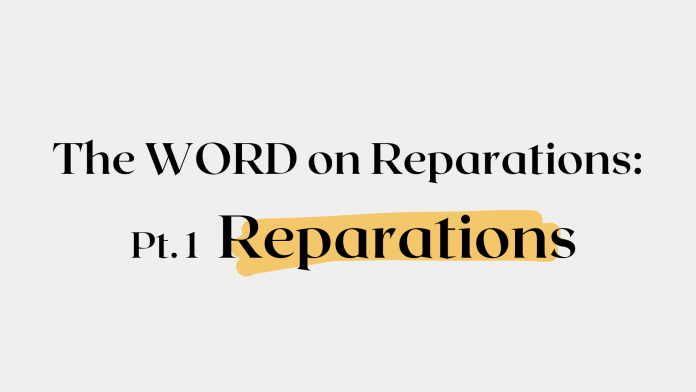The Student Assembly Ad-Hoc Committee on Reparations is partnering with the Flat Hat for a series entitled: The Word on Reparations (or, The Word, for short).
Reparations. If you’re like most people, the word provokes a myriad of complex emotions. Emotions like anger, passion, joy contempt, excitement. These emotions are as visceral as the perception of the word. Regardless of your opinion on reparations, a reckoning this summer has propelled the conversation around reparations back into the public eye. And for a word that holds so much and means so much to different groups of people, it is ill-defined.
Perhaps by design, the word “reparations” is a slippery eel, evading many intellectuals who never truly came to a solid, digestible explanation. How could they? The word harkens back to a morally murky part of the American past. Unfortunately, reparations and its past seem tied together, and if there’s a word that garners more complex emotions than reparations, it’s slavery — the very thing reparations are meant to atone for.
A year ago, the College of William and Mary Student Assembly created an Ad-Hoc Committee on Reparations. The Committee was tasked with looking into the College’s history of oppression, enslavement and discrimination and to determine what we might do today to atone for those past cruelties. As co-chair of that Committee, I’ve had the pleasure of talking … and talking … and talking about the word reparations. Through discussions with students, faculty, staff and Williamsburg community members, I’ve been inundated with feedback about the meaning, and possibly interpretation of reparations. At times, this can be quite daunting, but I’ve come to appreciate hearing all the ideas each individual has to come together and participate in restorative justice. The many viewpoints of others have helped me better understand reparations. Through these talks and my research, I’ve been able to de-sensationalize the word, make it less slippery and easier to interpret. However, this work continues to be long and arduous.
If you want my two cents: conversations surrounding reparations are not going away. Not any time soon. Why? The issues that continue to plague the Black community — as evidenced by what happened this summer — are not going away either. As long as Black people in the United States continue to be marginalized by institutional power, thought leaders will ponder restitution for those oppressions. Ultimately, we’ll continue to talk about reparations, because we’ll continue to see instances where restorative justice is necessary.
The work of reparations is rooted in creating equitable, sustainable practices for those that have suffered injustice. As we come closer to understanding the best way to carry out this work, the closer to one another we become. For such a divisive word, I see it as a massive opportunity to unite.
Still, one of the most fruitful exercises I’ve found in coming to better understand this word is hearing opinions and getting perspectives on the problem. So, in an effort to unite the College community, we want to share our opinions and dialogue about the word reparations and what it conveys. The goal is not to change your mind, it’s to get you thinking and talking with others.
Ifeoma Ayika ‘21 is majoring in government and minoring in philosophy at the College. She currently serves as Undersecretary of Multicultural Affairs within the Student Assembly. She is also a WMsure student fellow, and serves on the government department’s Student Advisory Board meant to address diversity. Email Ifeoma at Ivayika@email.wm.edu.




































